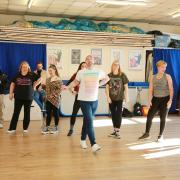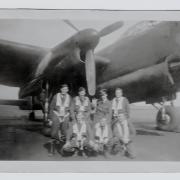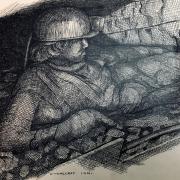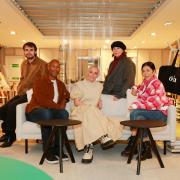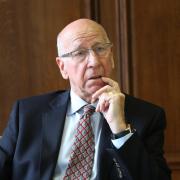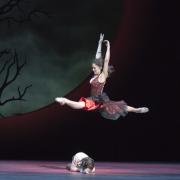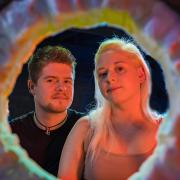Lewis Collins may have played television and movie tough guys – characters that were unfailingly ‘macho’ – but Bodie from The Professionals was a more nuanced person than his screen persona suggested.
The holder of a private pilot’s licence and player of a number of musical instruments, Collins was born on 27th May 1946, born in a country and region still scarred and reeling after the end of the Second World War, which had only drawn to a close around nine months before.
Despite a rich local history – Bidston is famous for Bidston Hill, the oldest of Birkenhead’s open spaces and Bidston Old Hall believed to rebuilt around 1620 by William, 6th Earl of Derby, a young Lewis head would soon be full of racier things: pop music and firearms.

It’s said, aged just two, Lewis won ‘The Most Beautiful Baby in Liverpool’ contest. His attended Gautby Road Primary and Grange School in Birkenhead, plus the Birkenhead Institute School but overall school was a struggle. Acquiring his first drum kit, aged 13, he cut his teeth in Dad Bill’s band before playing in The Renegades as the Merseybeat phenomenon grew. He also belonged to the Liverpool Central Rifle Club and became a crack shot.
To cut a longish story short, he became an apprentice hairdresser and, it was during this period, he had the chance to audition to be the Beatles drummer (after Pete Best and the group went their separate ways) but declined that opportunity.
It was in October ’64 that Collins quit the salon and became the bassist with The Mojos and performed on a couple of their singles. Encouraged by the group’s erstwhile success (it had reached as high as no. 9 in the UK Singles Chart with a previous disc) Collins quit Liverpool for London only to find that the group’s promising past wasn’t to be repeated. The group disbanded in September ’66 leaving Lewis in London but without a calling.
After a few temporary jobs he decided to try acting and attended the London Academy of Music and Dramatic Art between 1968-71 – he was now in his mid-20s. After graduating, Collins started off in the theatre including in Glasgow in 1972 when he learned how to sign so he could communicate with deaf and mute children. He conceded this was the most satisfying work he ever had.
In 1973 he made his first move into TV when he appeared in Z Cars, a popular Liverpool-based series which ran for more than 800 episodes between 1962 and ’78. By the mid-‘70s Collins was a regular on the small screen.
His breakthrough role came in The Professionals, a drama based on the USA’s ‘Starsky and Hutch’ which was to air from 1977-83. If his decision on the Beatles had been rough luck, here he got a lucky break. Martin Shaw was cast as Raymond Doyle and the original pick for ex-para William Bodie had been Anthony Andrews. This partnership didn’t survive the first week of filming due to a perceived lack of chemistry. Step in Lewis who was drafted in and was happy to perform many of his own stunts. The Professionals was laddish and comes laced with chauvinism, hubris and testosterone. There’s lots of villains, of course, including Cold War villains; it was of that era.

If The Professionals had made Lewis, it had also typecast him and it wasn’t easy for him to break out and achieve the other roles his talents merited. As the ‘80s dawned Collins missed another heaven-sent opportunity when he auditioned to be the next Bond after Roger Moore but failed to get the role, being marked down as too aggressive.
He did move into cinema though beginning with his depiction of the SAS captain Peter Skellen in Who Dares Wins in 1982, a film largely but loosely based on the Iranian Embassy Siege of 1980. In a case of life imitating art, or vice versa, Collins had been in the military, serving as a private in the 10th Battalion Parachute Regiment, a Territorial Army unit, from 1979. In 1983, perhaps inspired by his recent film role, he applied to join the Territorial SAS but was rejected because of his celebrity status despite the fact he’d passed the selection process for 23 SAS, one of the two Territorial battalions. This was the end of his military career.
Collins continued with TV and film work including the 1988 TV film Jack the Ripper with Michael Caine. Collins brought George Godley to life, the role based on a real police officer who’d also worked on the case. The film was made to mark a century since these unsolved crimes had occurred. Although he wouldn’t have known it, Collins’ career had peaked and the ‘90s saw less success for him.

He married in 1992 to Michelle Larrett with whom he had three sons, and moved with his family to Los Angeles in the mid-‘90s. His final acting role would be in an episode of police drama, The Bill, in 2002. There’d be no more acting for Collins as he left Britain for good in 2003; his final decade would be spent working in the States where he sold computer equipment.
Lewis Collins died of cancer on 27th November 2013 in his adopted home of Los Angeles, aged 67. Shortly before his death he’d made a final visit to the UK and spent some time on Merseyside.
Among his other accomplishments, he held a private pilot’s licence, was a jujitsu black belt and had been trained in karate. He liked playing his musical instruments, including the piano, flute and guitar, enjoyed motorbikes, parachuting – although he broke both ankles- and guns, which he collected. He was also a screenwriter, voice artist, director/filmmaker, drama teacher, charity.






